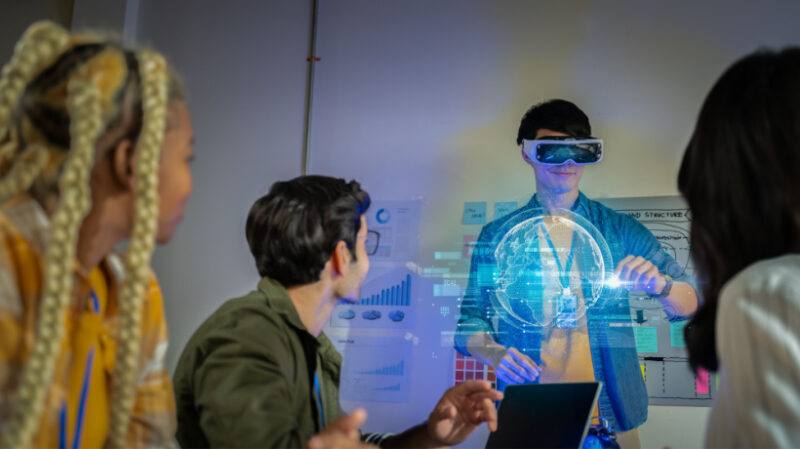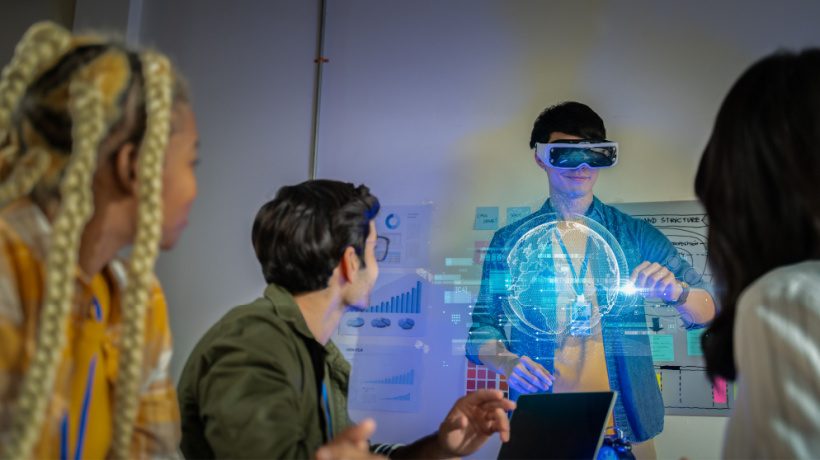Education
Encouraging Inclusivity In The Workplace Through VR Training
[ad_1]

Boosting Workplace Inclusivity With VR
Workplace inclusivity is a necessity as companies become more and more diverse. It’s all about creating a work environment where everyone feels like they belong, no matter who they are, and know that they can bring their ideas and fresh perspectives. Employees are happier when they’re aware that they work for a bigger cause and that their contributions are meaningful. If you’re wondering how to foster this welcoming atmosphere, technology can play a pivotal role. In this article, we talk about how Virtual Reality (VR) can transform your business and make it a haven for your diverse employees. Let’s explore how you can do that and what VR can bring to the table.
Inclusivity Challenges In The Workplace
Unconscious Bias
Unfortunately, most people have biases and may not even realize it. These can affect the way colleagues treat each other and may hinder hiring, promotions, and communication during a typical workday. Even a seemingly benign stereotypical comment can be harmful and create a hostile work environment. Since this isn’t uncommon, you want to target your VR training to help everyone get along and encourage them to reflect on their assumptions and beliefs.
Lack Of Diversity In Leadership
Having a diverse leadership team is crucial for creating an inclusive workplace. When employees see leaders from all walks of life, they are more likely to believe in their own potential for growth and success. To promote diversity in leadership, you can leverage VR training in ways we’ll dive into below.
Accessibility Problems
It’s essential to make sure that everyone can easily access the workplace, whether it’s in person or online. When a workplace isn’t physically or digitally friendly, it can be challenging for everyone to feel included. That’s why it’s essential to invest in creating spaces and tools that cater to everyone’s needs so everyone can feel welcome and valued.
Workplace Harassment
Experiencing workplace bullying and harassment can be demoralizing and make employees feel unsafe. Therefore, your organization must have clear and friendly anti-bullying and anti-harassment policies in place. There must also be a way for your people to report incidents without fear. Employees should always know that any form of violence is not acceptable and that there are going to be consequences.
Unequal Pay
Are you paying your employees equally? We all know that it’s unfair when people get paid less based on their gender or race. It sends the message that not everyone is equally valued. To make things right, companies should regularly check for these pay differences and address them head-on so that everyone is treated fairly.
6 Strategies To Foster Inclusivity Through VR Training
1. Diverse Scenarios
Understanding and embracing different cultures is crucial, especially in a multicultural company. VR training can create immersive scenarios where employees can have a hands-on experience with cultural diversity. You can have your team visit a virtual restaurant in Japan and learn about local etiquette or virtually attend a traditional Indian wedding to explore the cultural norms. Most importantly, no matter the scenario or the VR course, you must include diverse characters of all ages, genders, races, and abilities. You can also allow them to customize their virtual avatar how they like. This way, every employee will feel represented. It’s also an effective method to battle bias and discrimination. Experiencing the world from a different perspective gives employees a chance to understand the difficulties their colleagues may face more deeply.
2. Anti-Bias Training
Anti-bias and diversity training create awareness and empathy among employees. It makes them more understanding of other people’s issues regarding their gender, age, disabilities, culture, or sexual orientation. This training aims to break down stereotypes and create a more supportive workplace. How does VR fit into this? VR modules can address common biases, harassment, and other critical problems. Your employees can easily recognize harmful or racist behavior and immediately confront or report it. Additionally, VR training provides a safe environment to explore various situations and experiment with different responses to help employees learn without consequences. For example, they can test their empathy skills by offering advice to a digital coworker or handling a virtual commotion. Plus, it’s a more engaging training process that prompts them to actively participate, thus better preparing them for real-life events.
3. Accessibility
When designing inclusive VR training programs, it goes without saying that they must be usable by all employees. This means that everyone, regardless of their physical, cognitive, or sensory abilities, should be able to easily navigate them. For example, the design should include high-contrast visuals, readable text, and adjustable options, catering to the needs of employees with visual impairments. It’s also important to incorporate other accessibility features, like haptic feedback, audio enhancement, or gesture-based controls. However, VR training must also raise awareness of issues faced by individuals with different types of disabilities. For instance, you can create modules that allow employees to experience what it’s like navigating the world in a wheelchair or with auditory impairments. This allows your people to empathize with their peers’ everyday problems. They can even advocate for their rights to participate in society without restrictions.
4. Feedback
When you’re learning in VR, it helps to have feedback that keeps you in the loop about how you’re doing. That’s where feedback mechanisms come in. They can take many forms, like audio cues, pop-up messages, visual indicators, and even haptic feedback, as we mentioned above. But how does this foster inclusivity? Let’s say your employees are in a virtual environment, interacting with avatars of different backgrounds and characteristics. If they say something inappropriate or insensitive or make a choice based on biases, a feedback message will kick in and inform them on the spot. Feedback mechanisms are effective in encouraging self-reflection as well. Employees will think twice before making assumptions or biased comments, laying the foundation for a more inclusive workplace.
5. Leadership Engagement
Leaders are the ones who set a positive example for a supportive workplace. If they happily engage in inclusivity training, others will join too. It’s not just about motivating employees, though. VR training addresses many challenging scenarios that leaders and upper management will encounter. Practicing dealing with challenging situations in Virtual Reality can help you handle similar real-life scenarios with empathy. Plus, it’s an excellent way for the team to collaborate and work on VR activities, share experiences, and build stronger relationships. This helps teams become more supportive and solve problems collectively.
Conclusion
VR training has immense potential for creating a safer and better workplace. The hands-on experiences it offers will allow your employees to step into the shoes of coworkers of different backgrounds, thus gaining unique perspectives. This contributes to an empathetic and supportive workforce that advocates for their peers’ rights and thrives personally and professionally.
[ad_2]
Source link
Related posts:












